The delegation from IT Park Uzbekistan, led by CEO Abdulakhad Kuchkarov, has concluded a visit to Shanghai, where it participated in the World Artificial Intelligence Conference (WAIC) and held meetings with Chinese companies to explore cooperation in the development of the startup ecosystem, venture capital investment, and strengthening partnerships.
As part of the visit, the official opening ceremony of the Khan Tengri Innovation Hub took place. The event was attended by delegations from Uzbekistan and Kazakhstan, marking another step toward enhanced regional collaboration and the creation of new opportunities for Central Asian startups seeking access to the Chinese market.
On the first day of the visit, Abdulakhad Kuchkarov delivered a welcoming address and participated in the opening ceremony of the Khan Tengri Innovation Hub, which brought together over 100 representatives of China’s tech industry. Other notable speakers included Zhaslan Madiyev, Minister of Digital Development, Innovations and Aerospace Industry of Kazakhstan, and Magzhan Madiyev, CEO of Astana Hub.
Mr. Kuchkarov emphasized the rapid development of Uzbekistan’s IT sector and startup ecosystem, as well as the countryэs openness to international cooperation.
During the conference, the role of IT Park in shaping Uzbekistan’s innovation ecosystem was presented, along with various support measures for startups and international technology companies. Attendees were also invited to ICT WEEK Uzbekistan — one of the key digital events in the region.
The Khan Tengri Innovation Hub is an international platform created to support startups from Central Asia as they enter the Chinese market and to strengthen interregional ties. The initiative is being implemented in collaboration with IT Park Uzbekistan, Astana Hub, and XNode.
During the opening ceremony, quadrilateral memoranda were signed, aimed at fostering collaboration and supporting the startup ecosystem of Central Asia.
A memorandum of cooperation was signed between IT Park, Astana Hub, Growth Vision Pro, and XNode to support Central Asian startups entering the Chinese market. XNode will organize an acceleration program, provide co-working and co-living spaces for regional startups, and offer assistance in promoting these startups in China.
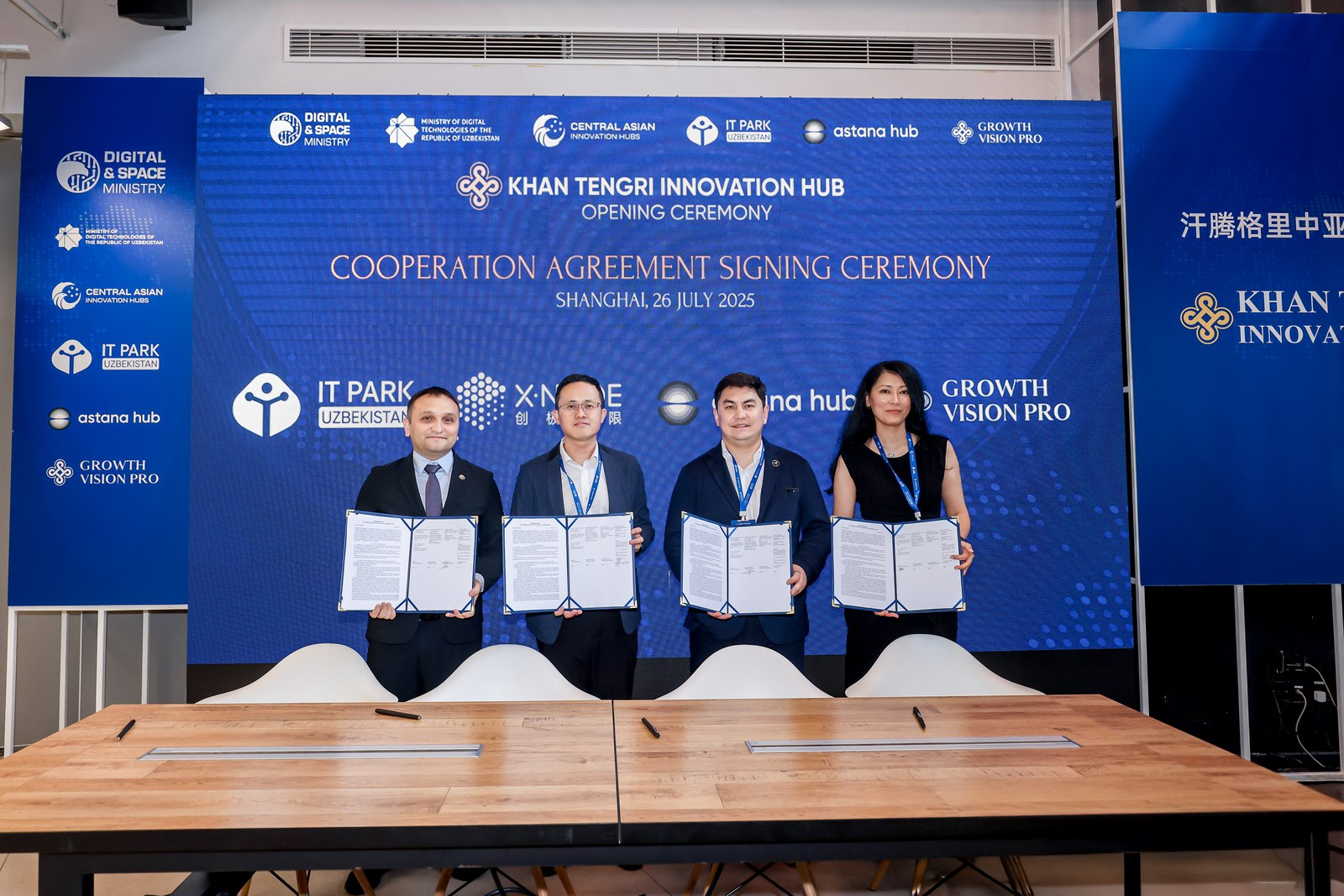
Another memorandum was signed between IT Park, Astana Hub, Growth Vision Pro, and S-Trone to organize joint events aimed at promoting the Central Asian regional startup ecosystem.
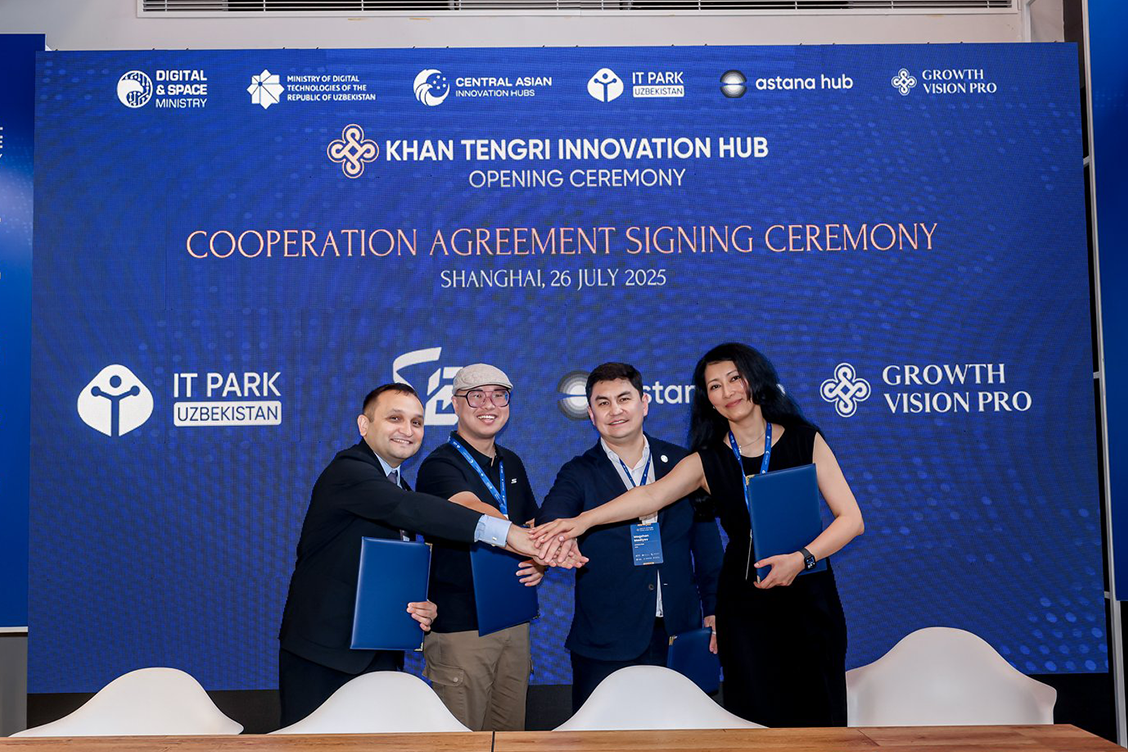
IT Park, Astana Hub, Growth Vision Pro, and the National Eastern Tech-Transfer Center signed a memorandum on strategic partnership to jointly develop the Central Asian startup ecosystem, launch soft-landing initiatives, and hold workshops for mutual integration of startups into regional markets.
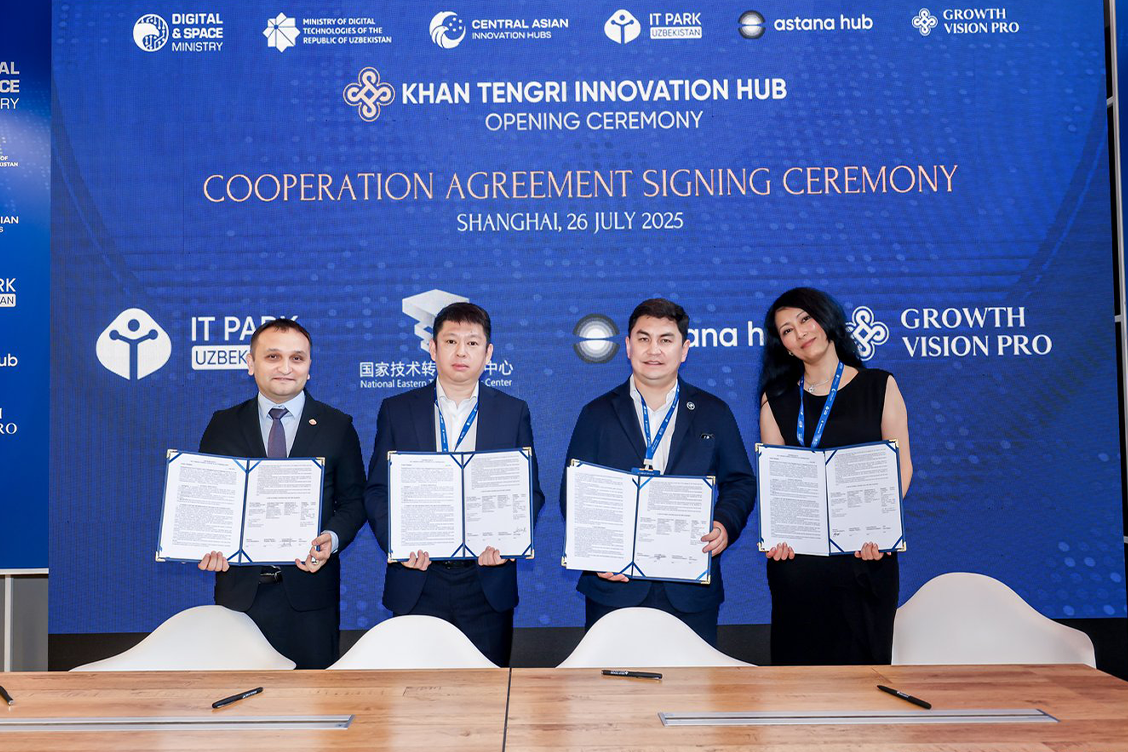
Abdulakhad Kuchkarov also spoke at the panel session titled “Beyond Boundaries: Building Agile Tech Ecosystems in a Shifting World”, where he shared IT Park’s experience in assisting startups access international markets, develop export potential, and strengthen connections with global tech hubs.
The session was moderated by Wei Zhou, CEO and founder of XNode. Panelists included: Magzhan Madiyev, CEO of Astana Hub; Jia Ren, Chairman of the Board at Sinnobator; Askar Belisbekov, CEO of Qazaqstan Venture Group; and Pavel Koktyshev, CEO of MOST Holding.
Deputy Director of IT Park Ventures Daler Nodirov also participated in the panel discussion titled “Capital Strategy for Innovation Leadership: The Cross-Border Investment Lens”, where he discussed key investment attraction strategies and shared IT Park Ventures’ experience in working with international venture funds, highlighting the importance of global cooperation in developing Uzbekistan’s innovation ecosystem.
The discussion included the following participants:
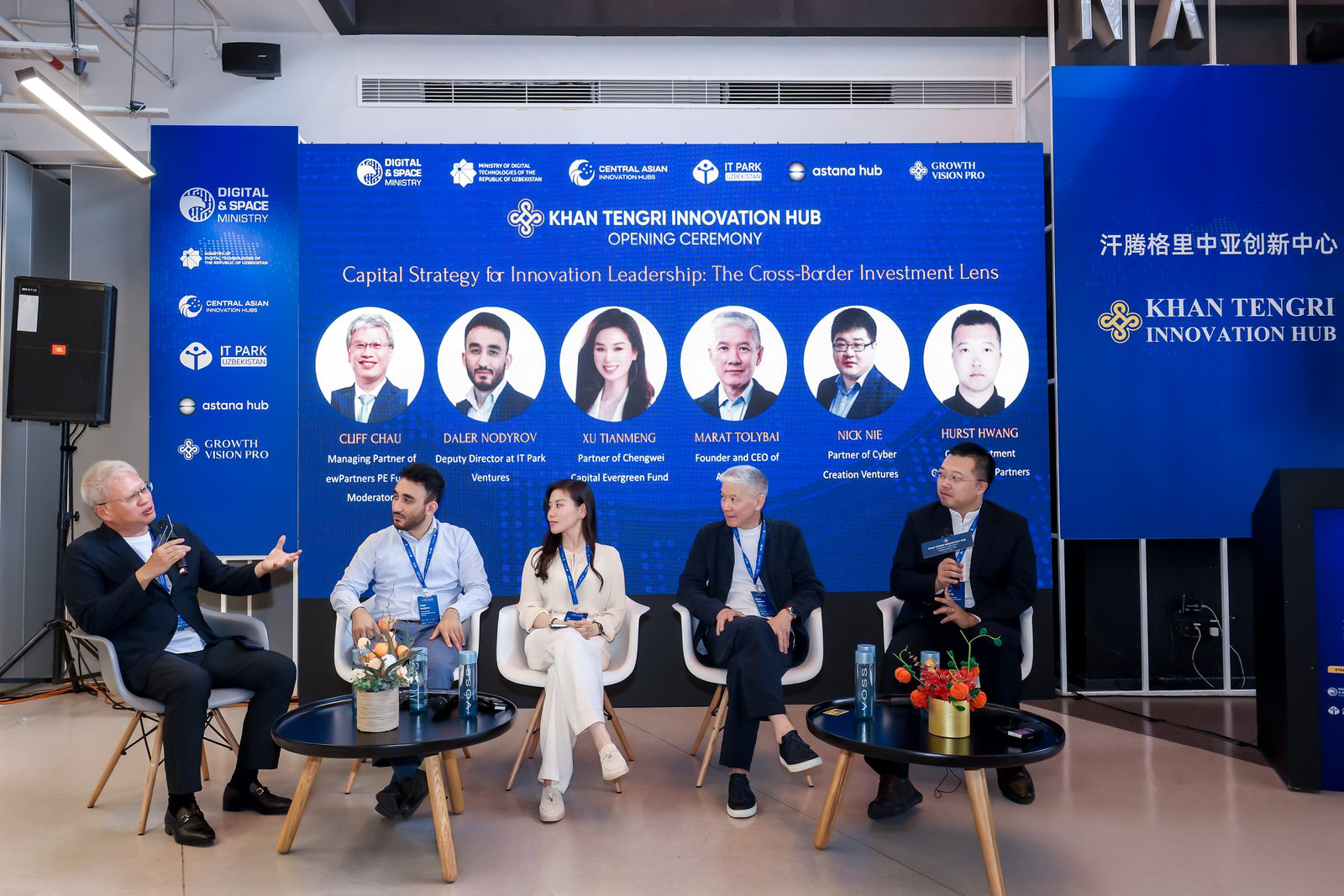
The opening ceremony of the Khan Tengri Innovation Hub concluded with a pitch session featuring Central Asian startups. Young teams presented their IT products and technological solutions to potential investors, partners, and representatives of the venture capital funds. Startups such as TASS Vision, Finarum, RealSoft, DriveLens AI, Arlan BioTech, Shai, Codiplay, and Grand Mobile demonstrated a high level of preparedness, scalability focus, and strong ambition to enter global markets.
The pitch session was attended by:
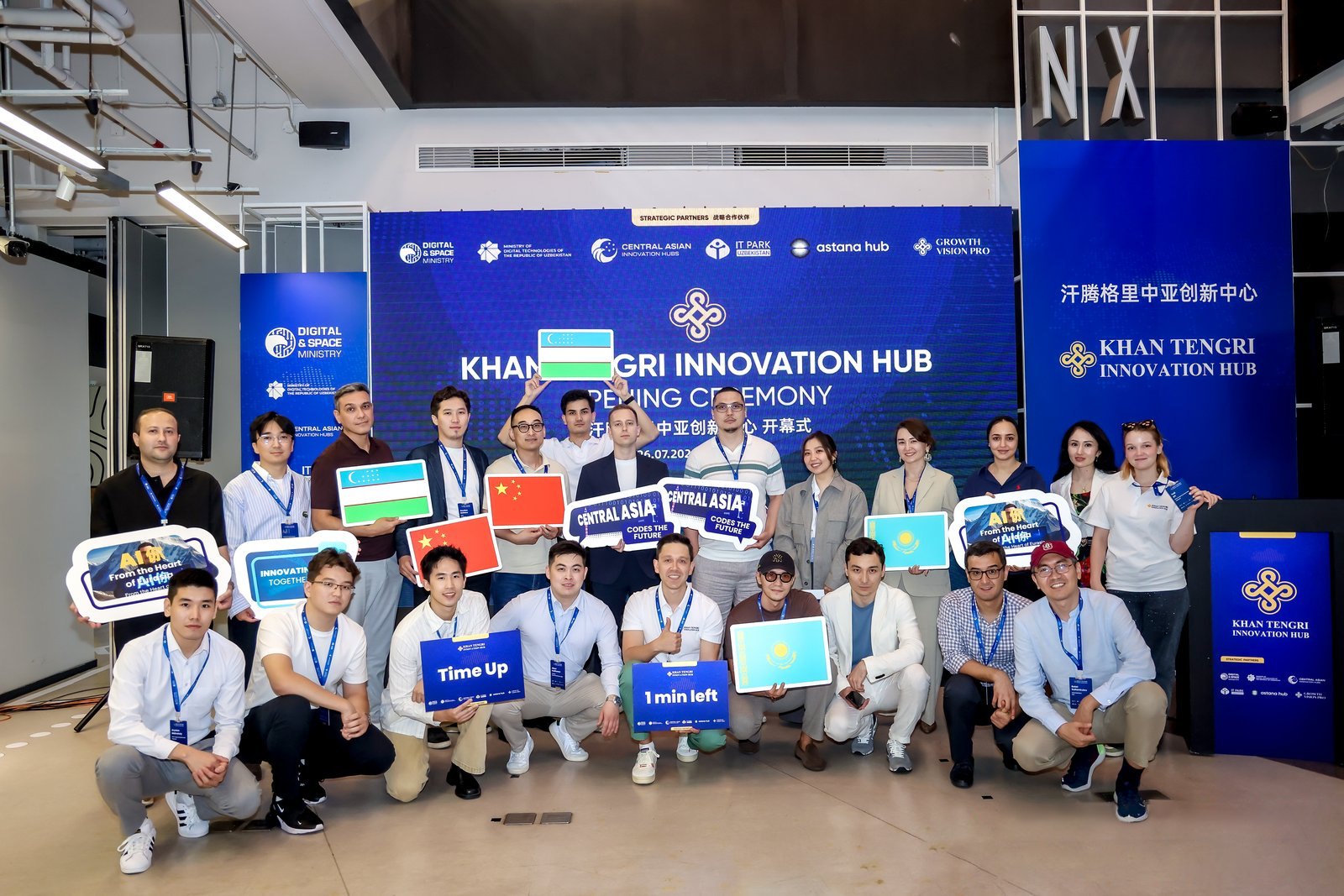
During the opening of the Khan Tengri Innovation Hub, the IT Park Uzbekistan delegation held a series of meetings with Chinese and international organizations involved in tech entrepreneurship, knowledge transfer, and the development of innovation clusters. Discussions focused on the possibilities of joint programs, investment cooperation, and comprehensive support for startups entering the Chinese and Central Asian markets.
In a meeting with XNode CEO Wei Zhou, the parties explored avenues of collaboration within the framework of the Khan Tengri Innovation Hub. Particular attention was given to launching an acceleration program for Central Asian startups, potentially in partnership with XNode. Discussions also included organizing specialized acceleration tracks with participation from Uzbek and Kazakh teams, and exchanging expertise between the ecosystems of Shanghai and Central Asia. Furthermore, the participants explored Uzbekistan’s potential in data labeling — a field that sparked strong interest from the Chinese side.
XNode is one of China’s leading private accelerators, specializing in startup development, international expansion, and corporate innovation programs. The company actively collaborates with global tech parks and supports foreign startups entering the Chinese market.
At a meeting with representatives from the Shanghai Technology Innovation Center (STIC), including CEO Celine Huang and Ding Lu from the Asian Association of Business Incubation, discussions focused on technology transfer cooperation, startup acceleration and incubation programs, as well as organizing bilateral visits and experience-sharing platforms. Participants recognized the high potential of collaboration between the ecosystems of Central Asia and China and expressed willingness to continue the dialogue.
The Shanghai Technology Innovation Center (STIC) is one of the city’s leading public institutions responsible for developing innovation infrastructure, technology transfer, and startup support. The center actively works with tech parks, accelerators, and international innovation initiatives.
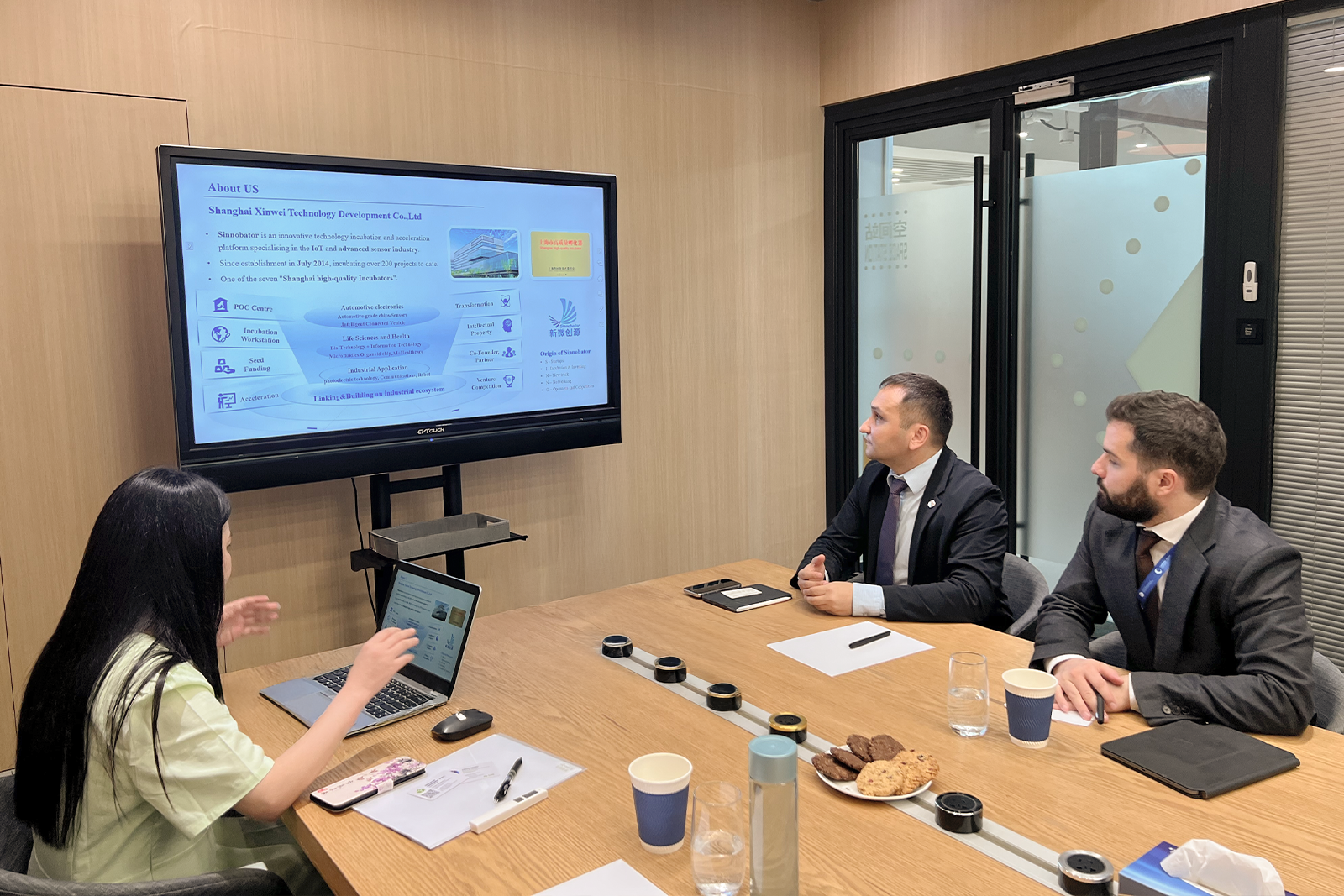
During a meeting with Sunny Cheng, a representative of Sinnobator, the parties discussed the company’s initiatives in startup support, cross-border collaboration, and innovation cluster development. Ms. Cheng expressed strong interest in projects from Uzbekistan and proposed continuing to explore collaboration formats, including joint acceleration programs.
Sinnobator is a Chinese innovation company focused on startup ecosystem development, international acceleration, and investment support for technological projects. The company actively engages with foreign tech parks and seeks new directions for cross-border collaboration.
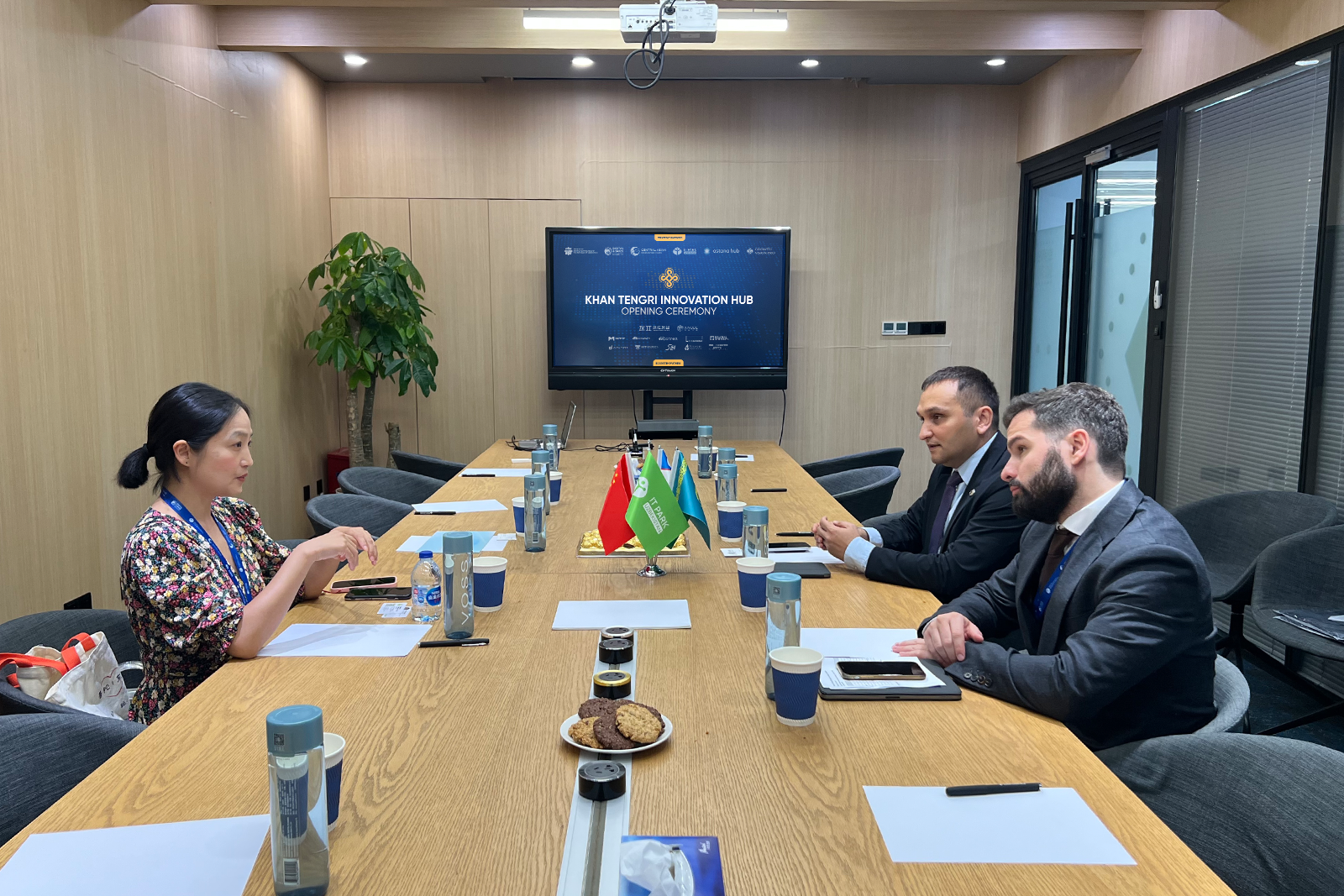
During a meeting with Mia Shen from the National Eastern Tech-Transfer Center of Shanghai (NETTC), discussions centered on involving Uzbek startups in Chinese R&D platforms, organizing joint events, hackathons, and business missions. The parties also discussed launching online workshops for Chinese teams interested in entering the Central Asian market and expressed interest in organizing a NETTC delegation visit to Uzbekistan.
The National Eastern Tech-Transfer Center of Shanghai (NETTC) is a state organization specializing in technology transfer, applied research support, and international cooperation in innovation. The center serves as a bridge between academic institutions, startups, and industrial partners.
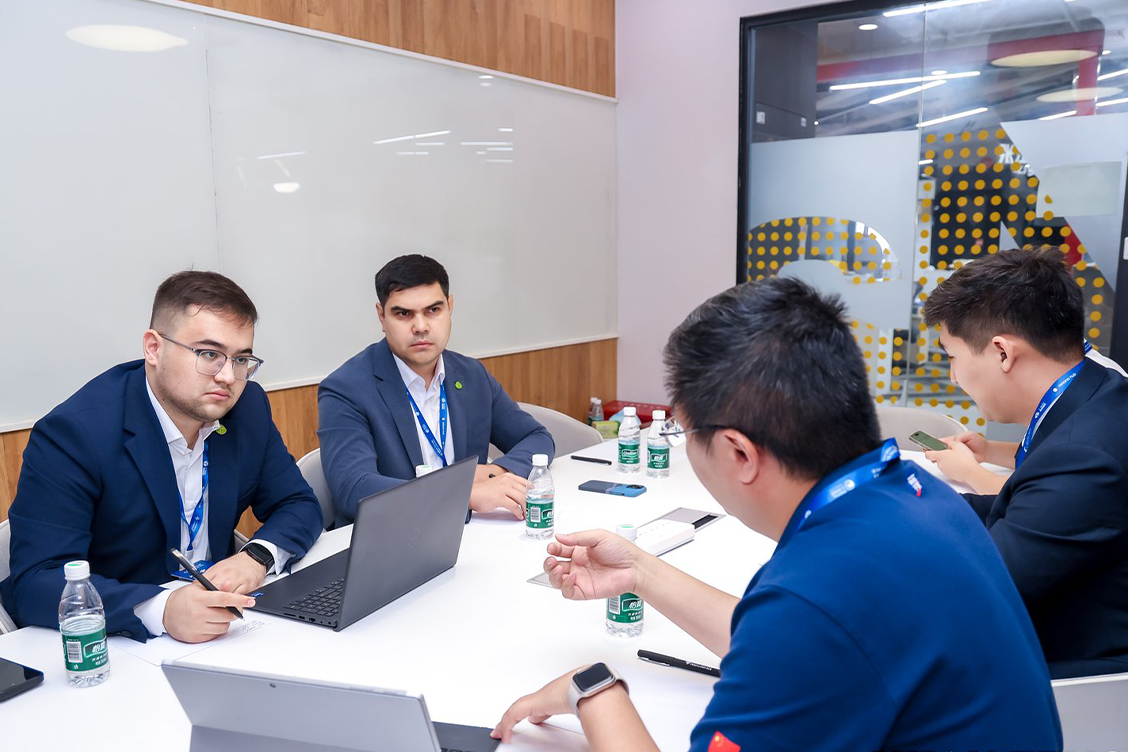
On the same day, a representative of IT Park Uzbekistan met with Adaspace China. The company expressed a clear interest in outsourcing data labeling tasks to Uzbekistan and signaled readiness for broader cooperation in the aerospace sector. Although discussions are still in early stages, both parties agreed to continue working on defining specific partnership areas and to develop a joint roadmap for the coming months.
Adaspace China is a leading company in the field of aerospace technologies in China, specializing in satellite manufacturing, satellite platform development, and the provision of commercial satellite data. The company actively develops Earth observation ecosystems, including the use of AI for satellite image analysis in fields such as agritech, urban planning, and security. With its strong innovation focus and technical expertise, Adaspace views international cooperation as a strategic priority for expanding its global presence.
As part of the visit, meetings were also held with two of the world’s leading companies in the field of data annotation — DataForce, a division of TransPerfect, and Appen. Both companies expressed significant interest in establishing cooperation with Uzbekistan, particularly in light of its growing potential in the data labeling sector. Company representatives were impressed by the local talent pool, the supportive IT Park ecosystem, and the competitive advantages Uzbekistan offers. These initial meetings laid the groundwork for more detailed discussions on potential projects and long-term cooperation.
TransPerfect is the world’s largest privately held provider of language and technology services, with over 100 offices worldwide. Founded in 1992, the company offers comprehensive localization, translation, content management, and AI solutions, including data annotation through its DataForce division. Its client base includes top-tier companies in high-tech, pharmaceuticals, finance, e-commerce, and government sectors. With its global scale and expertise, TransPerfect plays a key role in enabling quality and scalability for AI systems around the world.
Appen is a global leader in data creation and annotation for artificial intelligence and machine learning systems. Founded in Australia in 1996, the company has over 25 years of experience delivering high-quality multilingual and multi-format datasets to global tech firms. Appen operates with a distributed workforce of over one million freelancers across the globe and covers more than 235 languages and dialects.
Furtheermore, Abdulakhad Kuchkarov delivered a speech at the Emerging Markets and Developing Countries Forum on Bridging the AI Divide, where he outlined Uzbekistan’s strategy to become an international IT hub and the implementation of its National Artificial Intelligence Strategy – 2030. The event gathered representatives from government bodies and international organizations from China, Malaysia, Singapore, and other countries.
Mr. Kuchkarov also visited the Central Asian Innovation Hubs exhibition stand, where he met with Uzbek and Kazakh startups participating in WAIC, including TASS Vision, Finarum, RealSoft, DriveLens AI, Arlan BioTech, Shai, Codiplay, and Grand Mobile.
As part of the visit, the delegation of IT Park Uzbekistan and Astana Hub visited four leading tech centers in Hangzhou.
The first was Chuanhua Science & Technology City, an innovation cluster specializing in biotechnology and digital medicine. The delegation was introduced to laboratories and platforms supporting the full cycle from research to commercialization.
Next, the participants visited Unitree Robotics, a company known for its quadruped robots and humanoid robotics. Representatives shared their developments in AI and the real-world applications of robotics.
At Dahua Technology, the delegation was introduced to video surveillance and security systems deployed globally. Dahua already operates in Uzbekistan through a local subsidiary and expressed a desire to expand its activities by adding data annotation services.
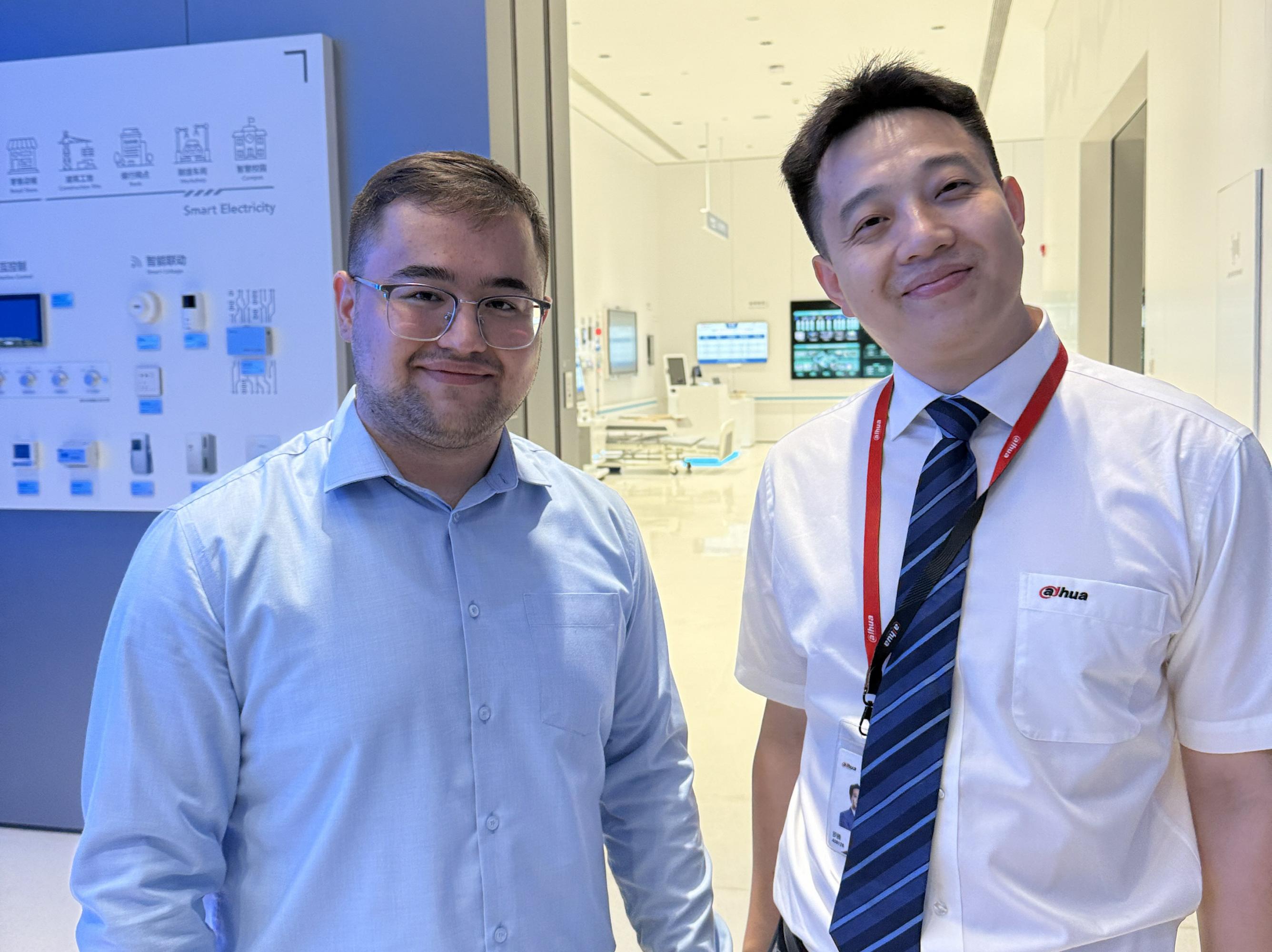
The company is currently considering obtaining member status at IT Park and stablishing a dedicated data annotation office. As part of this initiative, Dahua representatives plan to visit Uzbekistan in August 2025 to meet with the IT Park team and further assess the operational and regulatory environment.
The final stop of the visit was Alibaba Cloud International, where discussions focused on cloud technologies, AI, and potential collaboration to support Uzbek startups through Alibaba’s global infrastructure. Both parties also explored prospects for cooperation on data-related services.
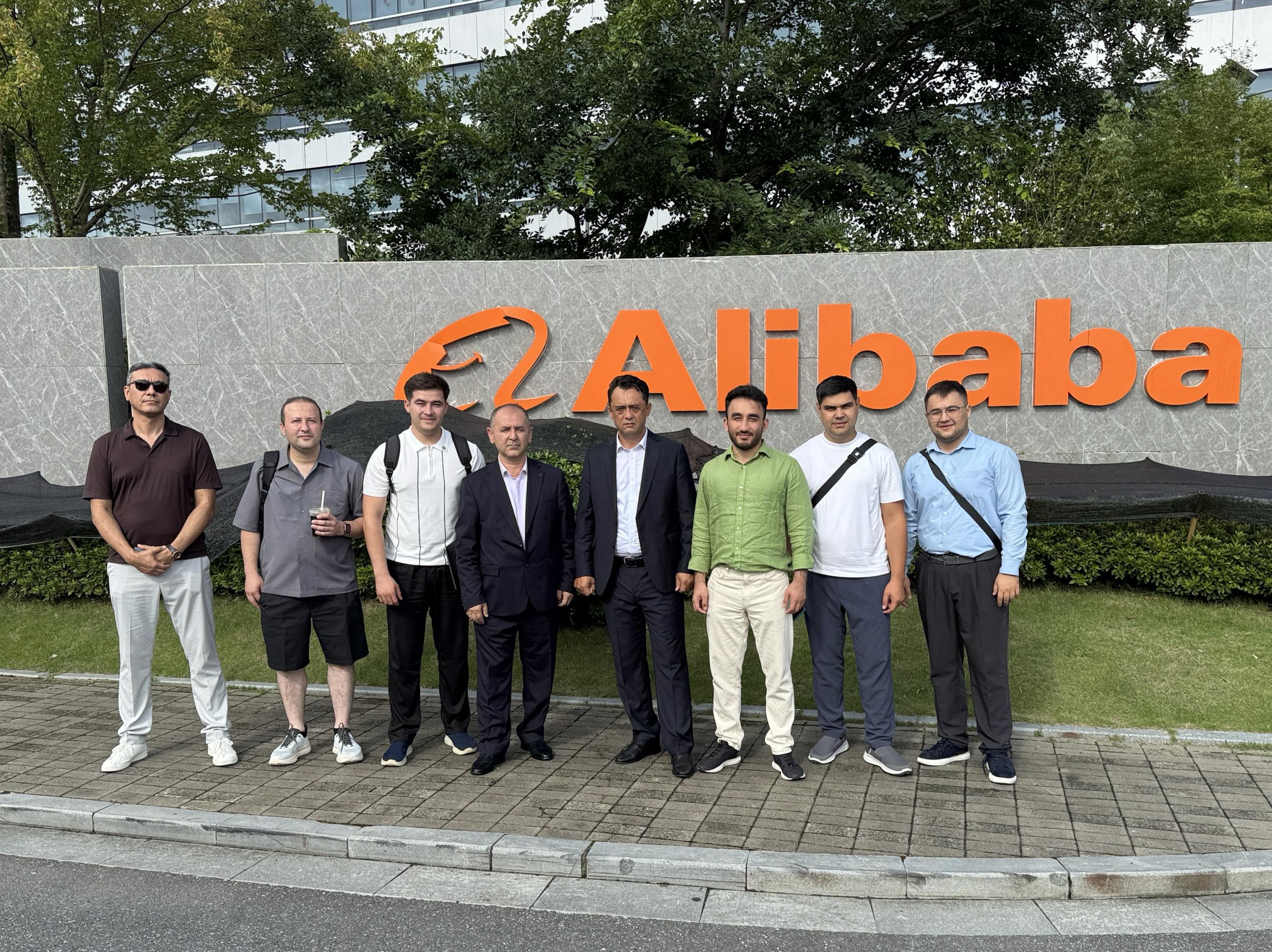
The visit to China marked an important milestone in strengthening IT Park Uzbekistan’s international partnerships. Engagements with leading technology hubs, the launch of the Khan Tengri Innovation Hub, and participation in the World Artificial Intelligence Conference in Shanghai opened new opportunities for startups and IT companies from Uzbekistan. The agreements reached during the visit will facilitate the development of joint projects, support the international expansion of Uzbek startups, attract investment, and promote the adoption of global best practices. These efforts are expected to contribute to the growth of the national IT ecosystem and reinforce Uzbekistan’s position on the global technology map.